
Call of Cthulhu is a horror fiction role-playing game based on H. P. Lovecraft's story of the same name and the associated Cthulhu Mythos. The game, often abbreviated as CoC, is published by Chaosium; it was first released in 1981 and is in its seventh edition, with licensed foreign language editions available as well. Its game system is based on Chaosium's Basic Role-Playing (BRP) with additions for the horror genre. These include special rules for sanity and luck.
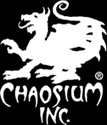
Chaosium Inc. is a publisher of tabletop role-playing games established by Greg Stafford in 1975. Chaosium's major titles include Call of Cthulhu, based on the horror fiction stories of H. P. Lovecraft, RuneQuest Glorantha, Pendragon, based on Thomas Mallory's Le Morte d'Arthur, and 7th Sea, "swashbuckling and sorcery" set in a fantasy 17th century Europe.

Delta Green is a contemporary era setting for the Call of Cthulhu role-playing game created by Adam Scott Glancy, Dennis Detwiller, and John Scott Tynes, a.k.a. the Delta Green Partnership, of the Seattle gaming house Pagan Publishing. The setting first appeared in a 1992 RPG scenario and revolves around a secretive organization tasked with protecting the United States from paranormal and alien threats. Delta Green combines the classic 1920s Cthulhu Mythos of H.P. Lovecraft with modern conspiracy fiction.

Call of Cthulhu: The Card Game is an out-of-print card game produced and marketed by Fantasy Flight Games from 2004 to 2015. It is based on Chaosium's Call of Cthulhu role-playing game, the writings of H. P. Lovecraft, and other Cthulhu Mythos fiction.

Robin D. Laws is a Canadian writer and game designer who lives in Toronto, Canada. He is the author of a number of novels and role-playing games as well as an anthologist.
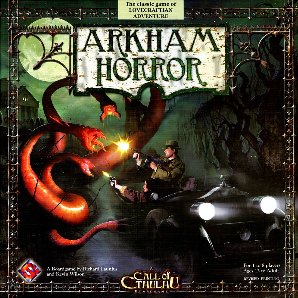
Arkham Horror is a cooperative adventure board game designed by Richard Launius, originally published in 1987 by Chaosium. The game is based on Chaosium's roleplaying game Call of Cthulhu, which is set in the Cthulhu Mythos of H. P. Lovecraft and other horror writers. The game's second edition was released by Fantasy Flight Games in 2005, with a third edition in 2018.
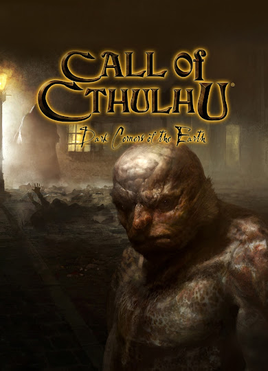
Call of Cthulhu: Dark Corners of the Earth is a survival horror video game developed by British studio Headfirst Productions for the Xbox in 2005 and for Microsoft Windows in 2006. It combines an action-adventure game with a relatively realistic first-person shooter and elements of a stealth game.

Kenneth Hite is a writer and role-playing game designer. Hite is the author of Trail of Cthulhu and Night's Black Agents role-playing games, and lead designer of the 5th edition of Vampire: the Masquerade.
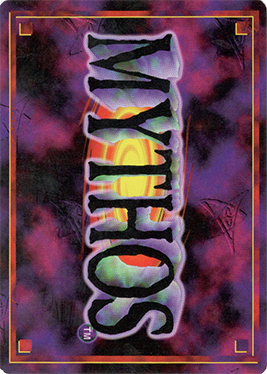
Mythos is an out-of-print collectible card game published by Chaosium from 1996 to 1997. It is based on the Cthulhu Mythos stories of the horror author H. P. Lovecraft, as well as on Chaosium's own Call of Cthulhu role-playing game.

Pelgrane Press Ltd is a British role-playing game publishing company based in London and founded in 1999. It is co-owned by Simon J Rogers and Cat Tobin. It currently produces GUMSHOE System RPGs, 13th Age, the Diana Jones award-winning Hillfolk RPG, The Dying Earth Roleplaying Game, and other related products. It publishes fiction under the Stone Skin Press imprint.
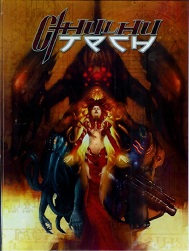
CthulhuTech is a science-fiction and horror roleplaying game created by Wildfire LLC and published by Sandstorm that combines elements of the Cthulhu Mythos with anime-style mecha, horror, magic and futuristic action. The setting is Earth in 2085 during a worldwide conflict known as the Aeon War, wherein the planet has been invaded twice: once by a black-skinned manufactured alien race known as the Nazzadi who are derived from humans and who join forces with them, and then a second time by the Mi-Go, an advanced alien civilization seemingly bent on the enslavement of humanity. Aside from these conflicts, the game focuses on other factions, such as ancient cults like the Esoteric Order of Dagon that are running amok across the planet and the eldritch horrors that are rising to destroy the world as, according to the prophecies of the Cthulhu Mythos, the "stars are right" and the Great Old Ones and their servitors are returning/reawakening to reclaim the Earth. The game uses a proprietary ten-sided die (d10) system titled "Framewerk."

The Gumshoe System is a role-playing game system created in 2007 by Robin Laws, designed for running investigative scenarios. The premise is that investigative games are not about finding clues, they are about interpreting the clues that are found. The Gumshoe System is used in various games published by Pelgrane Press. As a result of the Hillfolk kickstarter, the SRD for the Gumshoe System has been made available for use under two open licenses: the Open Game License (OGL) and Creative Commons Attribution.
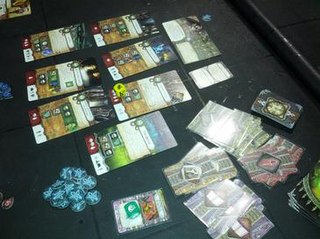
Elder Sign is a cooperative card and dice game, based on the Cthulhu Mythos of horror writer H.P. Lovecraft and Chaosium's Call of Cthulhu roleplaying game. It is published by Fantasy Flight Games, which also produces the Cthulhu Mythos games Arkham Horror, Call of Cthulhu: The Card Game, Mansions of Madness, and Eldritch Horror.

The Esoterrorists is a Contemporary Occult tabletop role-playing game, written by Robin D. Laws, and published by Pelgrane Press in 2006.

Gareth Ryder-Hanrahan is an Irish game designer and novelist who has worked primarily on role-playing games.
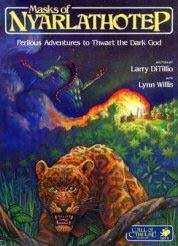
Masks of Nyarlathotep, subtitled Perilous Adventures to Thwart the Dark God, is an adventure campaign first published by Chaosium in 1984 for the second edition of the horror role-playing game Call of Cthulhu. A number of revised editions have subsequently been published. Masks of Nyarlathotep is a series of several sequential adventures set in the 1920s that take the player characters from New York, to London, Cairo, Nairobi, and Shanghai as they deal with the threat of the god Nyarlathotep. Screenwriter Larry DiTillio wrote the adventure with game designer Lynn Willis during a writer's strike. It received positive reviews in game periodicals including Casus Belli, The Space Gamer, White Dwarf, Different Worlds, and Dragon, and is considered to be one of the best roleplaying adventures of all time.
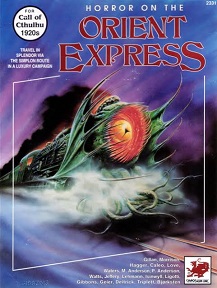
Horror on the Orient Express is a campaign boxed set published by Chaosium in 1991 for the horror role-playing game Call of Cthulhu. In this adventure, the player characters use the Orient Express to search for pieces of an artifact, while a cult tries to stop them. The original edition won two Origins Awards and received positive reviews in game periodicals including The Unspeakable Oath, White Wolf, and Dragon. A revised and expanded edition was published in 2014, which won three ENnie Awards.
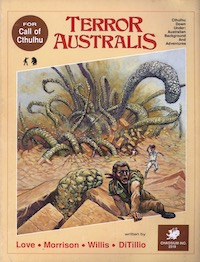
Terror Australis is a supplement published by Chaosium in 1987 for the horror role-playing game Call of Cthulhu, itself based on the works of H. P. Lovecraft. It was written by Penelope Love, Mark Morrison, Lynn Willis, Larry DiTillio, and Sandy Petersen, and is intended to be used as a sourcebook for adventures in Australia in the 1920s. It received positive reviews in game periodicals including White Dwarf, Casus Belli, and Dragon. A revised and expanded second edition was published in 2019, which won two ENnie Awards.

Kingsport: The City in the Mists is a supplement published by Chaosium in 1991 for the horror role-playing game Call of Cthulhu that describes a mysterious Massachusetts city.



















